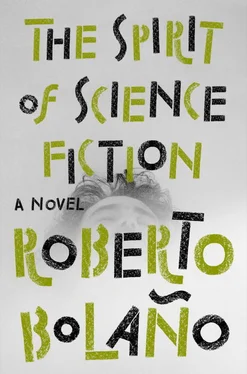Dear James Hauer:
I read in a Mexican magazine that you’re planning to form a committee of American science fiction writers in support of Third World countries, especially Latin America. It’s not a bad idea, maybe a little vague, though the magazine’s reporting may be more to blame for that than your proposal. Just so you know, I’m a Latin American science fiction writer. I’m seventeen, and I have yet to see anything I’ve written in print. I did show a few stories to a teacher of mine back home, a decent man, madly in love with Scott Fitzgerald (and, in a calmer way, the Republic of Letters) as only a reader from one of our Latin American countries can be. Think of a pharmacist from the Deep South or someone stuck in a small town in Arizona, a fanatic admirer of Vachel Lindsay, and you’ll get the idea. Or not and just keep reading. Anyway, as I was saying, I delivered my gibberish into the hands of this person, and I waited. When he had read my story, the good man said: dear Jan, I hope you haven’t been smoking. He was referring erroneously to marijuana, which as far as I know doesn’t cause hallucinations, but he meant that he hoped I wasn’t fucking myself up on acid or something. (I have to warn you that in high school I had a reputation as a bright student, though prone to “absentmindedness” and “distraction.”) Sir, I said, it’s a science fiction story. The man thought for a few seconds. But, Jan, he replied, those things are so remote. His index finger drifted upward in a northwesterly direction and then almost straight down south, poor tremor-afflicted soul, or poor mind of mine, which even back then could be rattled and unfocused by Reality. Most respected sir, I argued, if you believe that we can’t write about interplanetary travel, for example, you leave us at the mercy of the dreams—and amusements—of others, in saecula saeculorum; notice, too, that my characters are Russian, which isn’t a random choice at all. Our dream, spluttered my never-too-esteemed teacher, should be 1928 France. Since I didn’t quite know what had happened in Paris that year, I took this to be the end of our conversation. The next day, when we met again at school, I said: teacher, someday you’re going to get fucked up the ass by 1939 France, lock, stock, and barrel. If I’d been able to read the future, such an insult surely would never have passed my lips. My oft-remembered teacher died just a few months later when he went for a walk by the light of the moon after curfew. The stories, meanwhile, were lost. So do you think that we have any hope of writing good science fiction? Will your committee, God bless it, award grants—Hugo grants, Nebula grants—to the Third World natives who do the best job describing robots? Or maybe the group that you head proposes to testify on our behalf—in solidarity, of course—on the political stage? I await your immediate response.
Affectionately, Jan Schrella
The workshop was led by Jeremías Moreno, prizewinning poet, and it was held in a small room on the third floor of the Faculty of Literature. On one wall, someone had written ALCIRA SOUST SCAFFO WAS HERE in red spray paint, ten inches from the floor, clear but unobtrusive, impossible to see if the visitor didn’t look down. Though at first glance the graffiti seemed completely innocent, after a few minutes of repeated reading it began to feel like a shout, an agonizing display. Judging by the paint, it wasn’t recent, and I wondered who could have written it, what good fairy had rescued it from the vigilantes of good manners, who this Alcira was who had set up camp a few inches from the floor.
To make things even more confusing, Jeremías asked me in a whisper what I wanted. I explained, maybe too eagerly, that Colin, the baseball expert at La Nación, had recommended his workshop to me. I used the words “advice” and “suggestion”; I was about to precede them with the adjectives “brilliant” and “happy,” but I was halted by his expression of complete bafflement. It had been only a few seconds, and everyone hated me already.
“Never heard of the man.”
“Short, dark… big nose,” I stammered.
“No clue.”
We were silent for a moment. I think it was the graffiti, the magnetic attraction of those red letters—which for some reason I immediately associated with poverty and kindness—that kept me from fleeing. I can’t remember when exactly Jeremías Moreno asked me to sit down or when he made the obligatory remarks about the country I was from. The members of the workshop had arranged their chairs in a circle, broken only by the door. There were no girls among the apprentice poets, I noted with a surge of discouragement, heightened, if possible, upon scanning their faces and discovering that not a single one of them looked like someone I’d want to get to know.
Who’s reading first? A skinny kid passed out three copies of a poem. I didn’t get one, but by craning my neck I could read the title on my neighbor’s copy. “The Willow,” said the kid. Heh-heh, it’s metaphysical, kind of. Go on, then. Threatened by a creeping mental fog, I counted twenty lines the way an insomniac counts sheep. Or maybe thirty. Or maybe fifteen kicks planted on the writer’s backside, followed by a silence, and some “hmm”s, some coughs, some faint smiles, some “uh-huh”s. I get the sense, said a fat kid, that you’re trying to con us. The rhythm, I think. No, it’s the gerunds—there should never be two in a row. And why all the “and”s? To make it more powerful. Make the willow more powerful. Fucking college kids, I thought. I learned everything I know from Mariano Pérez, said the author, trapped. (Mariano Pérez, as I later learned, was Jeremías’s buddy and the coordinator of the other workshop, the official Faculty of Literature workshop.) Is that so? said Jeremías resentfully. Well, I still think it sounds bad, said the fat kid. I know for a fact that you’ve done better work. Actually, to me it sounds like Frost, broke in a kid with glasses. Jeremías almost erupted. The only Frost you’ve read is in anthologies, you bonehead. Let me see, read that line again, the one about the willow weeping. T. S. Eliot? Bonifaz Nuño? Mariano? Let’s not implicate Mariano in this crime, please. Interesting the way the lines are arranged, said the kid with glasses. Jeremías grabbed a copy from the poet next to him. If you turn it upside down and look hard at it, it could be a willow. Spatial arrangement, I suppose—Jean-Clarence Lambert? I swear it’s a coincidence. Maybe you’re just a bad reader, said Jeremías, conciliatory and weary of the discussion. Who wants to read it again? You do it, Jeremías, you’re the best reader. All right, then. Ahem, let’s give it a try. Does the willow remember its horizon? Why, yes—crocodile smile—there’s a hint of Mariano here, no doubt about it. That’s because Mariano is my model. I can see that. Look, cut the first twenty lines and keep the ending, it’s really powerful. Who wants to read next?
The kids shuffled through their papers, reluctant. Jeremías consulted his watch with the professional flourish of a psychoanalyst. I heard shouts from the hall, voices, kids calling good-bye, doors slamming, until another poet, one who had so far opened his mouth only to exhale cigarette smoke, passed out three copies, like the first kid.
When the reading was over, everyone nodded in the same blissful state. Man, you’re really improving, Márquez, said Jeremías. But try not to bring up love so much—it makes you sound like Horace. I think our friend Márquez is in love. Ha-ha-ha. Nods of agreement were followed by gripes about Márquez’s luck. Nice poem, yes sir. In gratitude, the object of this praise passed around a pack of Camels previously kept under lock and key in the pocket of his sweatshirt. Carefully, I lit a cigarette, and I smiled because everyone was smiling. This kind of workshop, I thought, was like a tiny dance club for shy, boring people, though as I would soon have occasion to learn, I was gravely mistaken. Didn’t you bring in anything else, Márquez? No, that’s all I typed up. Did you really like it? It’s a good poem: unpretentious, epigrammatic, forceful, declared Jeremías. Márquez’s face changed colors, a strange soup of mingled pride and vulnerability.
Читать дальше












